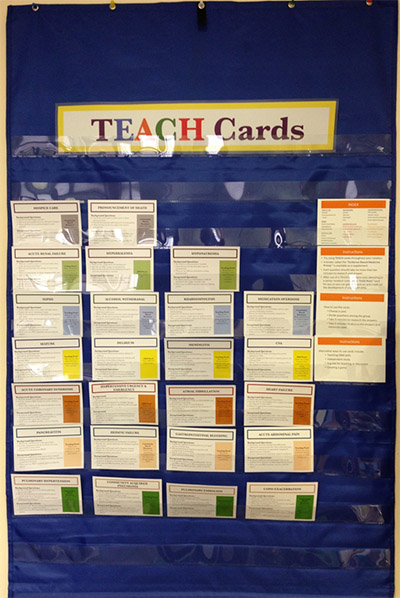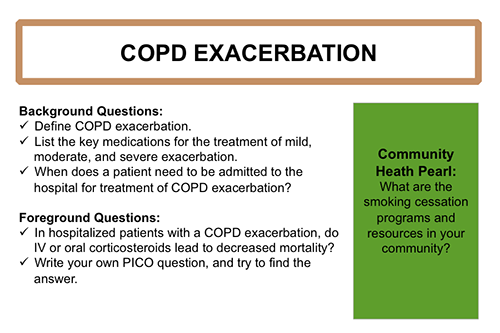On this page:
Overview
TEACH Cards (Teaching Evidence-based medicine And Clinical topics in the Hospital) is an inpatient educational tool created at the University of Wisconsin-Madison Family Medicine Residency Program in 2013. TEACH Cards allows for efficient 5-10 minute teaching sessions on busy inpatient medicine services and promotes two curricular goals: to enhance core clinical knowledge and to improve patient-centered evidence-based medicine skills. There are 50 different cards, each covering a different clinical topic. Topics were selected from the AAFP Recommended Curricular Guidelines for Family Practice Residents for Care of the Critically Ill Adult.
Instructions for use
- Cards can be used for 5-10 minute teaching sessions by both day and night teams.
- Choose a card that pertains to a patient on your service or to a topic you want to learn about. Anyone on the team can lead the discussion.
- Discuss the background questions (basic clinical questions) as a group, and look up answers as needed.
- Answer the foreground questions (focused clinical queries in PICO format – Patient population/problem, Intervention, Comparison, Outcome) in one of the following ways:
- Everyone can look up the answer to the written foreground question in 5 minutes using an evidence based resource (see below for a list of resources) and then share the answers they find with the group.
- Everyone can write a specific clinical question in PICO format, take 5 minutes to research the answer using an evidence-based resource, and then share the answers with the group.
- Answers are intentionally not provided.
- Cards can also be used for independent study.
How to Use TEACH Cards
EBM resources
- American Family Physician
- Cochrane Database
- BMJ Clinical Evidence
- DynaMed
- Essential Evidence Plus
- PubMed
- TRIP Database
- UpToDate
TEACH Cards
Paper version
To print on paper, you can use the TEACH Cards Full Deck PDF. Cards 6-55 are TEACH Cards. If you use a printing company, you can have card 3 printed on the back of each card. Card 2 is the instructions, and cards 4-5 list the card topics. For more durable cards, print them on 4×6 card stock with glossy finish. The paper cards can be displayed in a display banner in the team room for easy access.
Electronic version
You can use the cards electronically on a computer or on your mobile device with the TEACH Cards PDF containing all 50 cards or with the links to individual card files (PNG images).
TEACH Cards Full Deck (PDF)
TEACH Cards Sample Card (PowerPoint)
Individual cards
Neurologic
Alcohol withdrawal
Cerebral vascular accident
Delirium
Hyperthermia
Hypothermia
Medication overdose
Meningitis
Neuroleptic malignant syndrome
Seizure
Serotonin syndrome
Traumatic brain injury
Cardiovascular
Acute coronary syndrome
Atrial fibrillation
Bradycardia
Congestive heart failure
Hypertensive urgency & emergency
Pulmonary
Acute respiratory distress syndrome (ARDS)
Asthma exacerbation
Community-acquired pneumonia
COPD exacerbation
Obstructive sleep apnea
Pulmonary embolism
Pulmonary hypertension
Renal
Acidosis
Acute renal failure
Alkalosis
Hyperkalemia
Hypernatremia
Hypokalemia
Hyponatremia
Rhabdomyolysis
Gastrointestinal
Acute abdominal pain
Gastrointestinal bleeding
Hepatic failure
Pancreatitis
Refeeding syndrome
Infectious disease
Cellulitis
Nosocomial infections
Post-operative fever
Pressure ulcers
Sepsis
Hematologic
Blood product transfusion
Heparin-induced thrombocytopenia
Sickle cell anemia
Endocrine
Adrenal insufficiency
Diabetic ketoacidosis
Myxedema coma
Thyroid storm
End of life
Hospice care
Organ donation/transplant
Pronouncement of death
Other cards
Back of card
OB-Newborn TEACH Cards
OB-Newborn TEACH Cards Full Deck (PDF)
Individual cards
Early Pregnancy
Ectopic pregnancy
First trimester bleeding
Gestational trophoblastic disease
Nausea/vomiting
Prenatal screening
Spontaneous abortion
Therapeutic abortion
Pregnancy Conditions
Abdominal trauma
Bacterial infections
Cholestasis of pregnancy
Complementary/alternative medicine in pregnancy
Gestational diabetes
Gestational and chronic hypertension
HELLP syndrome
Intrauterine growth restriction
Late pregnancy bleeding
Obesity in pregnancy
Placenta previa
Post-dates pregnancy
Preeclampsia and eclampsia
Substance use in pregnancy
Thyroid disease
Viral infections
VTE in pregnancy
Labor
Induction of labor
Intrapartum fetal monitoring
Pre-labor rupture of membranes (PROM)
Labor after cesarean/VBAC
Labor Complications
Fetal distress in labor
Intra-amniotic infection (chorioamnionitis)
Labor dystocia and augmentation
Operative vaginal delivery
Placental abruption
Preterm labor
Retained placenta
Shoulder dystocia
Stillbirth
Uterine rupture
Post-partum
Breastfeeding/lactation
Endometritis
Post-partum contraception
Post-partum depression
Post-partum hemorrhage
Newborn
Congenital heart disease/heart murmur
Developmental dysplasia of the hip (DDH)
Hyperbilirubinemia
Intestinal obstruction
Neonatal abstinence syndrome (NAS)
Neonatal circumcision
Neonatal HSV
Neonatal respiratory distress
Neonatal resuscitation
Neonatal sepsis
Newborn feeding
Newborn screening/prevention
Non-accidental trauma (NAT)
Other cards
Back of card
References
- Hahn TW, D’Agata C, Edgoose J, Mastrocola J, Zakletskaia L, White M. TEACH Cards: Teaching Evidence-Based Medicine and Clinical Topics in the Hospital. PRiMER. 2018;2:25
- Hahn TW, Regner C, Metzger E, Zakletskaia L, Birstler J. OB-Newborn TEACH Cards: A Curricular Tool for Maternal-Child Rotations that Influences Patient Care. PRiMER. 2022;6:2
For questions or comments, please contact Thomas Hahn, MD.
Thank you to the following contributors: Jay Brieler, MD; Jensena Carlson, MD; Caitlin D’Agata, MD; Jennifer Edgoose, MD, MPH; Sarah Hilding, MD; Jennifer Mastrocola, MD; Emily Metzger, MD; Caitlin Regner, MD; Emily Torell, MD and Mattie White, MD.
TEACH Cards is licensed under a Creative Commons Attribution-NonCommercial 4.0 International License.




